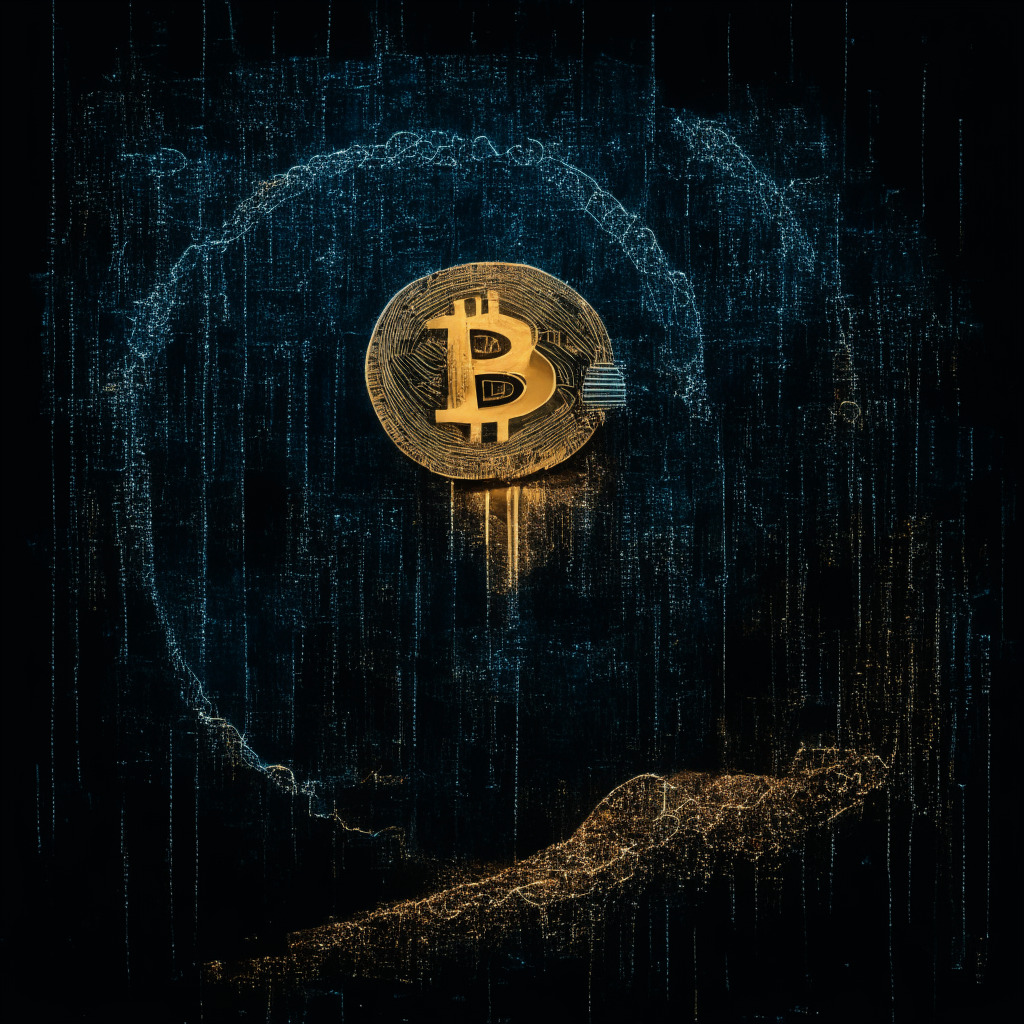Crypto exchanges including OKX and Bybit have delisted Russian banks Tinkoff and Sberbank, due to Western sanctions following the Ukraine invasion. Despite this, the decentralized nature of P2P transactions makes complete enforcement challenging. The delistings highlight the growing reliance on cryptocurrencies amid Russia’s economic instability due to these sanctions.
Search Results for: Russian Central Bank
Russian Firms Take Leap into Future with Adoption of Digital Ruble
Russian firms are adopting the central bank digital currency (CBDC), the digital ruble. Sirius Innovation Science and Technology Center and Rostelecom are pioneering this journey with their digital wallets, highlighting the practical application of this currency. However, this new model poses challenges for traditional financial institutions, and concerns remain about security and potential economic disruption.
Russian Legislator Predicts Global Foray of Digital Ruble by 2025, Possible Shift in International Trade
A high-ranking Russian legislitor, Anatoly Aksakov, predicts that domestic corporations will utilize the nation’s digital ruble, a Central Bank Digital Currency (CBDC), by 2025, especially in Latin American nations. He also suggested potential usage could transform “mutual settlements” among these nations.
Rosbank’s Bold Endeavor: Embracing Digital Ruble Amidst Security Concerns and High Costs
“Rosbank, a trailblazer in the digital currency revolution, invested $1.6 million on integrating its systems with the digital ruble merely two months into the CBDC pilot. Emphasizing on secure transactional gateways, engaging complex cryptography solutions, and investing in specialized expertise, Rosbank stands resolved to overcome challenges of safety concerns, technological hurdles, and costly investments in this digital financial infrastructure.”
Exploring Russia’s Pivot to Crypto: Boosting Trade Ties or Cannibalizing Traditional Banking?
Russian entrepreneurs aim to use “digital assets” and a “unified digital currency” for trade with BRICS and other nations. The idea of utilizing digital financial assets (DFAs), which may encompass digitized commodities, CBDCs, digital securities, cryptoassets, and stablecoins, in international payments is garnering attention. The possibility of creating a unified digital currency for cross-border transactions is also being evaluated.
Binance Sheds Russian Operations: A Smooth Transition or Stumbling Block for Global Crypto?
“Binance, a leading cryptocurrency exchange, has sold its entire Russia business to CommEX. Its chief compliance officer states operating in Russia wasn’t in line with Binance’s compliance strategy. Similarly, the Swiss bank, Hypothekarbank Lenzburg now trades digital securities types on the blockchain-rooted platform, SDX.”
Exploring the Probability of Marking Digital Ruble Tokens: A Double-Edged Sword for Russian CBDC
The Russian Central Bank potentially explores “marking” digital ruble tokens to track CBDC transactions, allowing close monitoring of funds usage. This suggests super-traceable tokens could be a reality soon, although there are cautionary notes around the required balance between regulation and autonomy in digital currency.
The Emerging Digital Ruble: Potential Transformation in Russia’s Banking Landscape
Anatoly Aksakov, head of Russia’s State Duma financial committee, predicts a reduced role for traditional banks as the Central Bank Digital Currency (CBDC), the digital ruble, gains adoption. Aksakov urges banks to align their infrastructure with blockchain technology to leverage CBDC’s financial capabilities.
The Impending Role of Blockchain: Will Digital Currencies Supersede Banks?
Russian legislator, Anatoly Aksakov, suggests the role of banks might diminish with advancements in blockchain technology, especially with the advent of the digital ruble. This technology presents a potential competitor to digital assets, raising concerns about financial stability. Aksakov believes this could render traditional banking obsolete, replacing human decision-making with automated actions.
Transforming Banks: How Russia’s Digital Ruble May Redefine Traditional Banking Structures
Anatoly Aksakov, head of Russia’s parliamentary financial committee, suggests a future where blockchain and Central Bank Digital Currencies (CBDCs) could erode traditional banking structures, with the digital ruble leading the way. Banks risk being marginalized unless they adapt to this new digital financial landscape.
Future of Transactions: A Russian Salon Charts New Course with Digital Ruble Payment
A beauty salon in Yekaterinburg, Russia, recently accepted its first digital ruble payment, pioneering the use of Russia’s Central Bank Digital Currency (CBDC) in the commercial sector. This case has sparked optimism that digital currency could offer unique payment solutions, even in areas with limited or no internet access.
Digital Ruble Trial: Unveiling Russian Banks’ Apprehensions and Expectations
In a climate of anticipation, Russian banks, including Sberbank and Tinkoff Bank, express apprehension towards Central Bank’s digital ruble trial. With last-minute exist from the pilot and hesitation from the Association of Banks of Russia (ASROS), questions emerge about the future of Central Bank Digital Currency (CBDC) ahead of a substantial meeting.
Testing the Digital Waters: Russia’s Central Bank Propels CBDC Projects Amid Skepticism
“The Russian banks MTS and PSB are testing the digital ruble, aiming for a national rollout between 2025-2027. With real-world applications like PSB’s digital wallet and promising transaction fees, skepticism still surrounds the quick adoption of this Central Bank Digital Currency (CBDC).”
Banking on the Digital Ruble: Heralding a New Era or Stoking Controversy?
The Russian Central Bank’s proposal classifies the digital ruble, as a “high-quality liquid asset”. This could usher a dramatic reconfiguration of how financial institutions perceive and maintain liquid assets, potentially revolutionizing cross-border payment methods. However, this shift is viewed with apprehension among commercial banks.
Navigating the Digital Ruble: Russian Banks Seek Clarity Amid Crypto Confusion
The Association of Russian Banks (ARB) is seeking clarity from Russia’s Central Bank on the eminent launch of Central Bank Digital Currency (CBDC), or digital ruble. In response to rising citizen apprehension, ARB is lobbying for specific regulations, such as prohibiting forced creation of digital ruble wallets and caps on digital ruble operator tariffs. However, ambiguity abounds regarding CBDC’s definition and potential global compatibility.
Belarus Takes Steps Toward Central Bank Digital Currency Amid Global Race
Belarus is following a digital revolution trend towards Central Bank Digital Currency (CBDC) initiatives, with preparations to launch a digital variant of the Belarusian ruble. This landmark project by the National Bank of the Republic of Belarus (NBRB) indicates potential for cross-border payments and compatibility with other global CBDCs.
Digital Rouble: Boon for Retailers, Bane for Banks? The Debate on Russia’s Virtual Currency Saga
Russia’s parliament voted in favor of the “digital rouble” bill, moving towards a digitized financial infrastructure. While retail businesses expect profit, concerns about potential bank losses over the rapid transition to digital money have emerged. A country-wide rollout is planned for 2025-27, marking a significant point in Russia’s financial growth.
Groundbreaking Crypto Payments Pilot by Russian Megabank: Pros, Cons, and Main Conflicts
Russian megabank Rosbank, in partnership with B-Crypto, has launched a groundbreaking cross-border crypto payments pilot, streamlining international transactions for companies. The initiative encounters potential roadblocks, such as liquidity concerns and varying global stances on digital currency regulation, making the future of cross-border crypto payments uncertain.
Cryptocurrency Debate in Russia: Central Bank’s Ban vs Finance Ministry’s Regulation Approach
In Russia, cryptocurrencies are considered too risky for most but suitable for professional investors, according to Ivan Chebeskov, director of the financial policy department at the Finance Ministry. While acknowledging the high-risk nature of cryptocurrencies, Chebeskov emphasized their potential for investment. Tensions arise between the Central Bank’s focus on banning cryptocurrencies and the Finance Ministry’s push for regulation and taxation, resulting in an uncertain future for Russia’s crypto market.
Russian Firms Turn to Crypto for Overseas Trade: Legal Repercussions and Future Regulations
Russian firms are using cryptocurrency for overseas transactions to circumvent US and EU sanctions, while operating within the existing legal framework. However, the Russian Central Bank expresses openness to digital currency-based trade, prioritizing the launch of a digital ruble and developing cryptocurrency regulations. The government’s balancing act between digital currencies and their digital ruble initiative remains to be seen.
Russian Bank Profits Soar in 2023: Breaking Records or Facing Sanctions Impact?
The Central Bank of Russia forecasts potential record-breaking profits for Russian banks in 2023, despite the 2022 challenges from unprecedented sanctions. This optimism follows a record quarterly profit of 881 billion rubles in Q1 2023, encouraging updated predictions from the National Credit Ratings agency. However, caution is advised due to ongoing impact from sanctions, economic conditions, and geopolitical events.
Digital Rubles in Russia: Exploring the Future of Transit Payments with Blockchain
Russia’s Central Bank is launching a digital ruble pilot project, starting from August 15, involving smaller retailers across 11 cities. This digital finance experiment aims at integrating the digital ruble into the Moscow Metro system, offering passengers the ability to pay through digital wallets or purchase smartcards using the digital ruble. Despite challenges, the Russian Central Bank remains confident about this futuristic transaction method.
Understanding the Arrival of Russia’s Digital Ruble: Hopes, Fears, and Future Possibilities
“The new law signed by President Putin introduces a digital ruble, operated by the Russian Central Bank, for money transfer and payment. This opens new possibilities and concerns alike, as the centralization draws apprehension from crypto enthusiasts who favor decentralization. Initial public response may be lukewarm, with mass adoption not anticipated before 2025 or 2027.”
Navigating Russia’s Path to Digital Ruble: CBDC Trials Amid Crypto Contention
The Russian Central Bank is set to start real-world tests of the digital ruble this month, marking a significant step in Central Bank Digital Currencies (CBDCs). This move comes as a response to international sanctions, fueling a demand for alternative trade options in Russia, including cryptocurrencies and the digital ruble.
A Rollercoaster Crypto Week: Triumphs, Tribulations, and the Quest for Unchartered Territories
“In a dynamic crypto week marked by revenue surges, privacy breaches, and promising tech advancements, we also see virtual activism in Metaverse, innovative crypto-related services, and increasing institutional embrace of digital assets. However, challenges persist with regulatory complexities and cyber threats.”
Unraveling Russia’s Digital Ruble: Combatting Corruption or Dodging Sanctions?
“The adoption of blockchain technology, like Russia’s digital ruble, offers potential to combat corruption by shrinking the shadow economy. It provides transparency in transactions and the possibility of reducing grey economy risks. Special offline wallets also allow it to reach areas where the internet hasn’t yet penetrated.”
Unfurling the Future of Finances: Russia’s Digital Ruble Takes the First Leap
Russia is set to launch a pilot program for its digital ruble with 600 participants and 30 retailers. This Central Bank Digital Currency (CBDC) initiative follows China’s digital yuan strategy and could see the digital ruble in active use by 2025, transforming the country’s financial landscape. The token has potential for making and receiving cross-border payments.
Distrust and Hesitation: Russia’s Digital Ruble Faces Uphill Battle with Skeptic Population
The launch of the digital ruble, Russia’s Central Bank Digital Currency (CBDC), faces opposition and skepticism among its own population. Currently being tested, it is yet to find widespread acceptance. According to a survey, only 13% of respondents intend to utilize it, and 32% are convinced that it’s some form of fraud. The Central Bank now faces the challenge of winning citizen trust.
Russo-Chinese Digital Currency Alliance: Pros, Cons, and The Inherent Power Tussle
Anatoly Aksakov, a Russian political figure, suggested potential compatibility between Russia and China’s Central Bank Digital Currencies (CBDCs) for international payments. With aims to use the digital ruble for global economic activities, this proposal hints at the possibility of digital currencies taking the centre stage in world trade.
Cross-Border Potency of Digital Rubles and Yuan: Boon or Bane for International Trade?
The dialogue between Russia and China’s central banks is accelerating speculation around Central Bank Digital Currencies (CBDCs). While Russia aims for early initiation with domestic commercial banks, China is progressing with offline and CBDC wallet tests. Meanwhile, Russia’s new legislation permits “non-residents” to own digital ruble wallets, establishing the digital ruble as an international trading tool. These developments challenge traditional banking norms and raise questions concerning international trade norms, regulations, and digital security.
Debt Default Fears & De-Dollarization: Russia’s Stance on the Shaky US Economy
Russia closely monitors the US economy amid debt default concerns and warnings by Treasury Secretary Janet Yellen. The ongoing crisis highlights economic system weaknesses, prompting countries like Russia to explore alternate solutions such as de-dollarization efforts and a potential common BRICS currency.
Unveiling the Future of Bitcoin: OpenAI’s Endorsement, Putin’s Dollar Shift Concerns and Price Trends
The CEO of OpenAI, Sam Altman, praises Bitcoin for its potential to combat corruption due to its independence from government control. He and Joe Rogan express concern over US handling of cryptocurrency regulation and central bank digital currencies. Despite recent price dips, Altman and Rogan remain hopeful for Bitcoin’s future due to its limited supply and decentralized mining. However, they caution that like all investments, cryptocurrencies are volatile and risky and require careful research and strategy.































